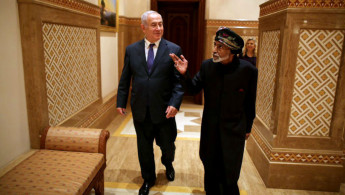Palestinians urge Arab world to unite as Israel seeks normalisation
The Palestinian Authority (PA) is seeking emergency sessions of the Arab League and the Organisation of Islamic Cooperation (OIC) amid worries of growing ties between Israel and Arab and Muslim states.
Israel has recently actively pursued rapprochement with a number of countries in the region and in Muslim-majority parts of Africa, including a surprise visit to Oman in October by Israeli Prime Minister Binyamin Netanyahu.
The visit was followed by high-profile tour by senior Israeli ministers to the UAE and Oman, while this week Bahrain invited Israel's economy minister to a conference in the country, due to take place next year.
In the latest indication of warming ties, Chad President Idriss Deby visited Israel on Sunday and met with Netanyahu, while the Israeli prime minister expected to make a return visit soon.
The Muslim-majority country cut-off ties with Israel in 1972 and Deby's visit was the first ever by a Chadian president.
"There will be additional visits to Arab countries soon," Netanyahu was quoted as saying during talks with Deby.
'Worrisome normalisation'
The Palestinian leadership is closely monitoring Israel's growing ties with Arab and Muslim states, an adviser to President Mahmoud Abbas said, stressing that warming relations with Israel violate past resolutions made at Arab League and OIC summits.
"There are a number of Arab and Islamic resolutions and declarations stating explicitly that there will be no process of normalization with Israel without a resolution of the Palestinian issue based on the Arab Peace Initiative and decisions of the international community," Nabil Shaath told Haaretz.
The recent high-profile establishment of warmer ties between Israel and Arab states is "worrisome", Shaath said, adding that there was a need to clarify the "Arab and Islamic" positions on Israel.
Shaath said preliminary contacts have been made to convene an emergency meeting of Arab foreign ministers, but most efforts to bring together Arab League members have focused on intra-Palestinian political reconciliation.
He said that Israel and the US are "exploiting" the division between Fatah and Hamas to draw closer to Arab and Islamic countries.
Mustafa Barghouti, head of the Palestinian National Initiative and a senior PLO official, said that Arab and Islamic governments should be punishing Israel instead of rewarding it, urging "widespread diplomatic activity", Haaretz reported.
Israel's Arab ties
Frozen peace efforts and Israel's five-decade military occupation of the Palestinian territories have been major obstacles in Israel's attempts to win official recognition from Arab and Muslim countries.
Israel currently has full diplomatic relations with only two Arab states - Egypt and Jordan.
Gulf states have held clandestine talks with Israel for decades, going back to at least the early 1980s.
Arab leaders have not, however, historically publicised talks over fears of a public backlash over the Palestinian-Israeli conflict.
Broader policy alignment, primarily on the need to contain Iran, have emboldened both sides to now make those talks public, sparking Palestinian fears of public "normalisation".
The 2002 Arab Peace Initiative affirmed Arab states would restore diplomatic ties with Israel in exchange for a peace settlement creating a Palestinian state that returned all land occupied or annexed in and since the 1967 war.
Follow us on Twitter: @The_NewArab





 Follow the Middle East's top stories in English at The New Arab on Google News
Follow the Middle East's top stories in English at The New Arab on Google News

![Israeli forces ordered bombed Gaza's Jabalia, ordering residents to leave [Getty]](/sites/default/files/styles/image_330x185/public/2176418030.jpeg?h=a5f2f23a&itok=_YGZaP1z)
